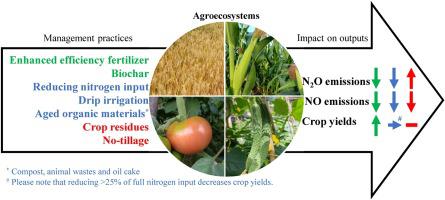Soil and Tillage Research ( IF 6.1 ) Pub Date : 2021-07-10 , DOI: 10.1016/j.still.2021.105142 Danzeng Yangjin 1 , Xiongwei Wu 1 , He Bai 1 , Jiangxin Gu 1, 2

|
Evidence from individual field measurements indicates that nitrous oxide (N2O) and nitric oxide (NO) emissions respond to a certain management practice in a similar or divergent manner. The objective of this study is to quantify the effects of various management practices on N2O and NO emissions and crop yields by performing a pairwise meta-analysis. We collected 39 peer-reviewed publications that recorded simultaneous measurements of N2O and NO emissions from various agroecosystems. Five management practices, namely reducing nitrogen (N) fertilizer input, application of enhanced efficiency fertilizers, biochar or aged organic materials (such as compost, animal wastes and oil cake), and drip irrigation, decreased both N2O (ranging from −24.9 % to −2.6 %) and NO (ranging from −48.1 % to −8.0 %) emissions. Reducing more than 25 % of the full N input is not recommended because of the significant loss of crop yields. Two management practices, namely returning crop residues and no-tillage, increased N2O emissions (ranging from 6.1 % to 12.9 %) and decreased NO emissions (ranging from −32.1 % to −21.2 %). The divergent effects highlight the importance of reasonably managing crop residues and no-tillage to limit N2O emissions.
中文翻译:

同时减少农业土壤中N 2 O 和 NO 排放的管理实践的荟萃分析
来自个别现场测量的证据表明,一氧化二氮 (N 2 O) 和一氧化氮 (NO) 排放以类似或不同的方式对某种管理实践做出反应。本研究的目的是通过进行成对荟萃分析来量化各种管理实践对 N 2 O 和 NO 排放以及作物产量的影响。我们收集了 39 份同行评审的出版物,这些出版物记录了来自各种农业生态系统的 N 2 O 和 NO 排放的同步测量。五种管理措施,即减少氮(N)肥投入、施用增效肥料、生物炭或老化有机材料(如堆肥、动物粪便和油饼)和滴灌,减少了 N 2O(范围从 -24.9 % 到 -2.6 %)和 NO(范围从 -48.1 % 到 -8.0 %)排放。由于作物产量的显着损失,不建议减少超过 25% 的全氮输入。两种管理实践,即作物残留物和免耕,增加了 N 2 O 排放(从 6.1 % 到 12.9 %)并减少了 NO 排放(从 -32.1 % 到 -21.2 %)。不同的影响突出了合理管理作物残留物和免耕以限制 N 2 O 排放的重要性。









































 京公网安备 11010802027423号
京公网安备 11010802027423号